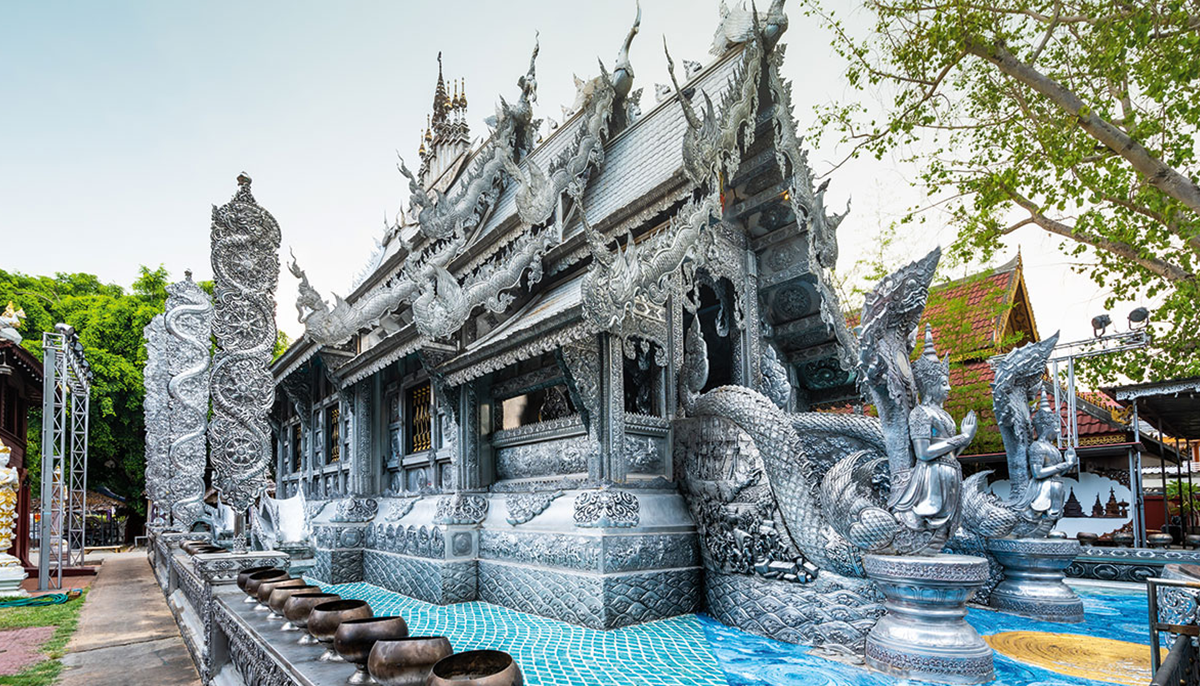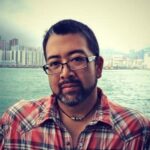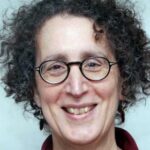“Buddha, Please Bless My Family”
In a silver temple, in the country of his ancestors, Ira Sukrungruang bridges the generations.
As our van pulls in, drums reverberate in the small temple courtyard, the music of celebration and grief. A funeral is taking place at Wat Sri Suphan, one of the oldest temples in Chiang Mai, Thailand. Some mourners exchange wrapped lotus buds, candles, and incense. Some sit on plastic chairs, hands pressed together in prayer. Some clench tissues tight, eyes rimmed red.
My mother lives on the outskirts of the city, and every time I visit her, I explore Chiang Mai’s Buddhist temples. What makes Wat Sri Suphan special is that the main hall is entirely silver. Wat Sri Suphan isn’t shy about its radiance—the silver exterior blinds with the afternoon sun—but women aren’t allowed inside, a reflection of the sexism pervading the country.
“It is what it is,” my mother says. “It’s how things are here. Explain it to them.”
Them is my new family—my stepdaughter, my wife, and our one-year-old son, Bodhi. This is their first trip to a country I consider my second home, the country of my ancestors. This is the first time my son has met his grandmother, and my first trip back since my father passed away less than a month earlier.
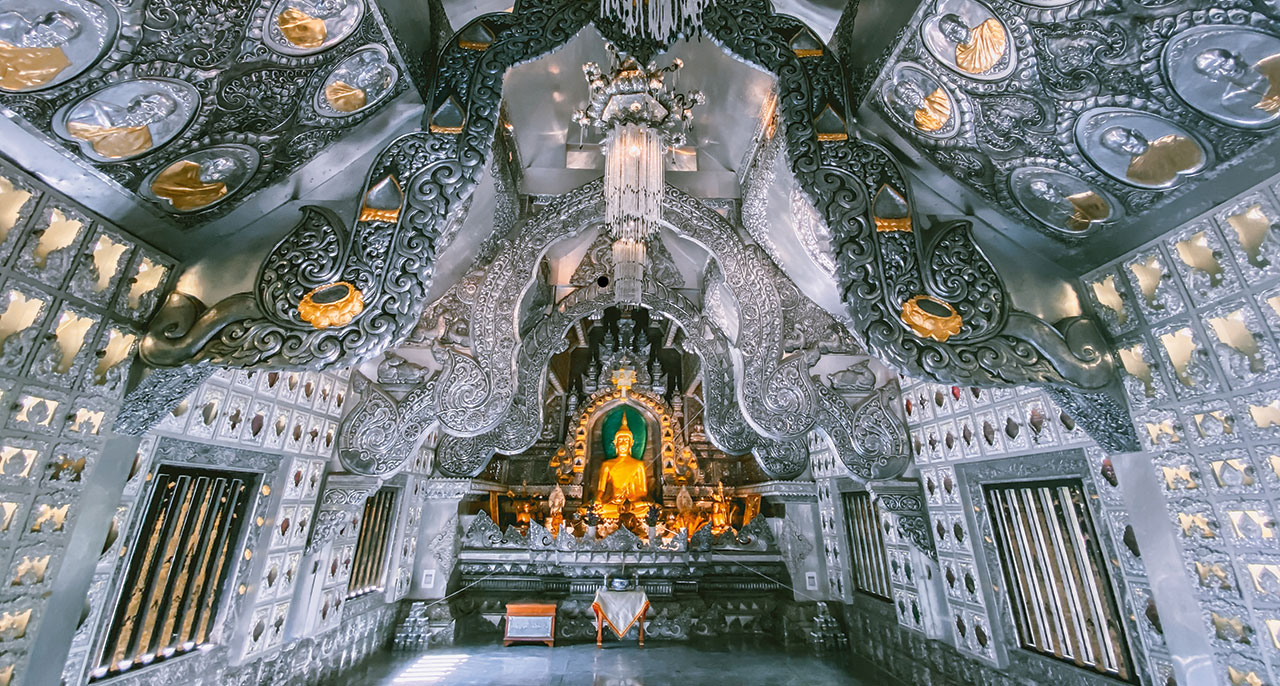
The funeral of a stranger continues. Not many take notice of us snapping pictures, dropping coins into silver bowls for good karma. The air is fragrant with incense, candle wax, and the wet smell of Thailand’s rainy season. I’m not sure we’re supposed to be here, but my mother says not to worry, says I worry too much.
I convey the information that women aren’t allowed inside the temple, and though my stepdaughter is disappointed she is quickly distracted by a kitten sunning itself in the palms of a Buddha statue. My wife tells me I should take Bodhi inside. She says not to worry, says I worry too much.
No one is in the temple. I put Bodhi down on the carpeted floor. His legs splay in front of him. His stillness is a rarity. He takes in the silver ceiling and the gaudy European chandelier.
“Let’s pray, Bodhi,” I say. When I kneel, he kneels. When I bow to the floor, he does, too. When I press my hands together, he mimics me.
“Buddha, please bless my family,” I say.
Bodhi says sounds I don’t understand.
“Bless my boy and the world he’s born into.”
Bodhi says sounds.
“Bless all that is lost, like my father.”
Bodhi says sounds.
Then I don’t say anything else.
I remember attending a Thai funeral for a grandmother I never met, my father’s mother, when I was five or six. I remember smoke rising out of the crematory, and my father whispering that my grandmother was floating into heaven. I thought how odd to be a body and then become smoke.
Bodhi totters to the front of the temple. He stares at the Buddha above, saying sounds to him. I marvel at my son, the wonder he embodies. I want to believe my father felt the same thing—felt that it was a miracle to witness his boy grow day by day.
My father did not know my fractured future—the divorce, the hurt I would carry with me for years. Nor did he know I wouldn’t be at his funeral, because he would die alone and there’d be no funeral. There’d be only me, on the other side of the world in America, rocking my son to sleep, as I mourned. And I am still mourning.
“Grab what’s here,” my father once told me during my long bouts of worry, “before it disappears.”
I grab Bodhi. I squeeze him tight.
When we leave the temple, the funeral procession begins. The casket is being taken to the crematory down the street. The van pulls out of the temple, and because it’s a small road, because there’s no other way to go, we follow the procession. Soon, Bodhi is asleep, his cheeks red from the heat, his hair wet on his head, but his closed eyes and lips are in deep peace.
The Territory of Love
Anita N. Feng on a wedding, a war, and a world that is always in flux.
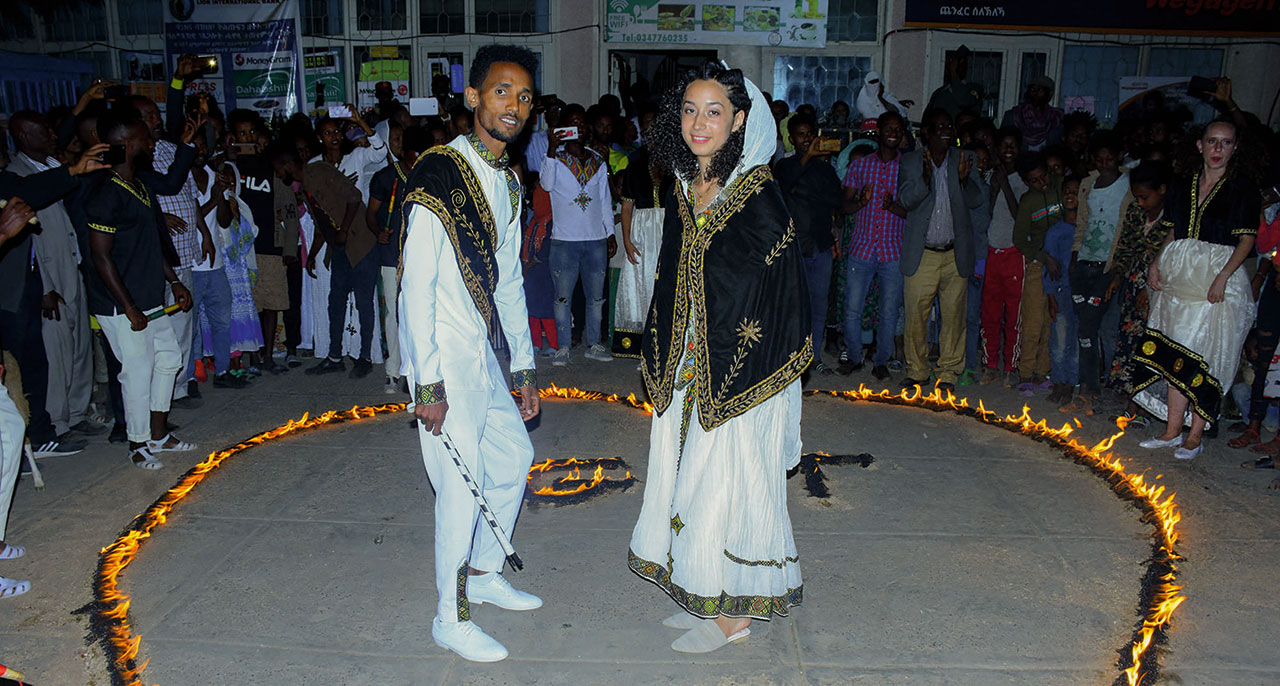
We were surprised at how easy it was to carry a voluminous, white wedding dress all the way from Seattle to a small village in Africa. It was difficult to navigate taxis and conveyor belts with this unwieldy item, but whenever anyone asked about what was in the huge bag, we offered up our daughter’s love story, and quickly all barriers melted away. Everyone was only too happy to help.
The story went like this. Our daughter, Tasha, was a Peace Corp volunteer in Tigray, Ethiopia, and she fell in love with Goitom, a bright, big-hearted young man from that village. We, her family, were on our way to celebrate their wedding. The expected guest list from the groom’s side was about 1,500. From the bride’s side? Three.
We arrived and the celebrations began. Wonderful and chaotic, delicious and bewildering, the party lasted for the better part of a week. Granted, there were a few challenges. It was the dry season, and there was no running water (except for two hours one day, when we all scrambled to take brief, cold showers). Electricity was intermittent, and an incompetent wedding photographer hijacked events with equipment that didn’t work.
But these inconveniences were minor compared to my daughter and son-in-law’s happiness and the embrace of new family. We danced every day, celebrated well, and returned home exhausted—this time with a well-used wedding dress stuffed into a suitcase. It had been a trip that enlarged our world, our family, our hearts, and our minds.
Travel is a meditation because we must constantly inquire: Where am I? What is this? And this? The jolt of foreignness can spur awakening—flooding us with change, that mark of existence we often don’t notice in our daily lives. The truth is, we’re always traveling, always in flux. We just don’t realize it most of the time.
So when I returned home, I thought we’d pick up where we left off, but it’s impossible to enter the same river twice. The world had already changed.
Almost immediately came the tidal wave of Covid. In March of 2020, after a month and a half of married life, my daughter, along with all Peace Corp volunteers worldwide, got their evacuation notices and were required to return home at once. The newly married couple would have to live apart until Goitom’s visa came through, and because of Covid and politics, visa services ground to a near halt.
Then came war. In the Tigray region where Goitom and his family lived, all communication outlets were cut. There was no travel. Medical facilities were looted and destroyed. Soldiers from Eritrea and the Ethiopian national army killed and violated countless citizens of Tigray.
We had no idea if Goitom and his family were safe. Was he fleeing with other refugees into Sudan? If so, how would we find him? Had he been conscripted into the Tigray army? Was he wounded—or worse? We were compelled to wait, all the while exploring one implausible solution after another.
But meditation teaches us that alongside the punishing physical distances that can separate us from loved ones, there is another space, which is most intimate and takes no time at all to traverse. That’s the territory of love, which, I’d suggest, is another word for what we do when we meditate. It’s a space of sanctuary and vulnerability—both at the same time.
Tasha and Goitom persevered with great courage and determination, and finally they were reunited, in February 2021, here in the U.S. Now they, just like the rest of us, are steering their way into the stream of being, and becoming.
The Broken Town
Pico Iyer meets the good people of a maligned place.
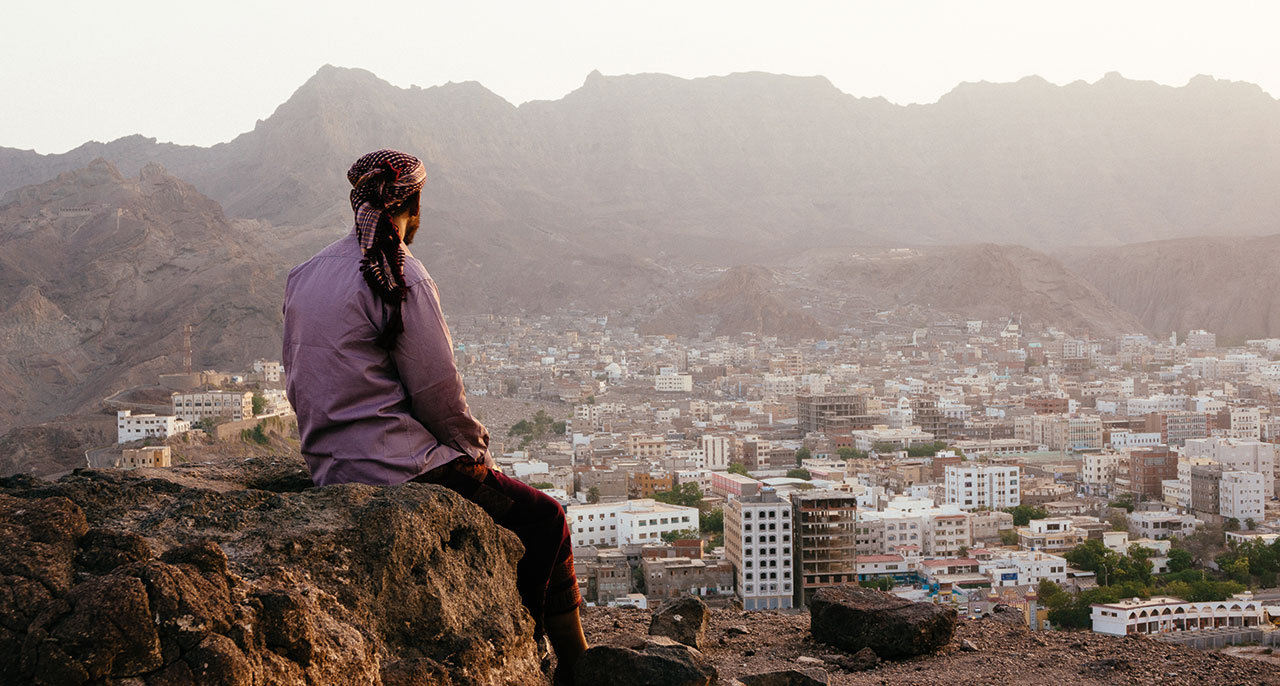
Goats were foraging along the empty, cracked main street. My taxi stopped at a red light—the only car in sight—and a hollow-cheeked old woman hammered at the window. There were no playgrounds to be seen, few shops, no bright lights. After forty years of unceasing warfare—the Brits, the Soviets, every group from North Yemen—the little town of Aden, on the oil-rich coastline of South Yemen, was as shattered a place as I had seen.
I’d been there, as it happened, when I was two years old. In those days Aden was the busiest port in the world outside Manhattan. Great ships stopped for refueling as they traveled between Britain and British India, and the place throbbed with all the energy that arises when East first touches West. Now it seemed a crying illustration of the Buddha’s first noble truth. Not many seemed to grow old here, and when eventually I found a place to sleep, I had to walk through a metal detector every time I approached the lobby.
All across the broken town, however, people extended more kindness to me, a relative millionaire, than I had any right to expect. A young man who spoke good English offered to show me around. We spent a long, hot afternoon in the cemetery where his mother, his sister, and some nuns who’d tried to be of help to the country now lay. When my flight out was abruptly canceled, the veiled matron in the airline office who rebooked my ticket took meticulous pains to hand me the forty dollars I was due as a refund. She could so easily have kept the money for herself. Forced now to travel across the country in the dead of night, past one roadblock after another manned by teenagers with assault rifles, I found an old man ready to drive me through the war zone for six long hours so I could fly away.
In its wounds, as in its kindness, Aden reminded me of so many of the other outposts of our global neighborhood where I seem to spend my time: Phnom Penh, Port-au-Prince, parts of L.A. Back in my mother’s house in California upon my return, as I was wondering how we in our gated communities could ever begin to do justice to our neighbors, my mother raced into the room, uncommonly agitated.
“That place you just came back from,” she cried, “the one we visited when you were a child. It’s on all the TV screens. There are planes flying into the World Trade Center, and it’s said they’re masterminded by a man whose ancestral village is in Yemen. We’re being told it’s a menace to our security.”
Suddenly everyone around me began talking about the long-forgotten country, pronouncing curses on it, claiming our first responsibility was to attack. It was all the fear, confusion, and hatred—which the Buddha had warned us about—that belonged not to real life but to our own turbulent heads and hearts.
I, simply by virtue of bungling through the country as a traveler just the month before, saw in my mind’s eye something very different. I saw the old man who had risked his life to drive me through treacherous roadblocks. I saw the friendly stranger walking slowly among the graves of almost everyone he cared for. I saw the veiled women in a back alleyway, tapping away on borrowed keyboards to try to track down loved ones—and new futures, perhaps—in Manhattan.
The world is always larger—more human—than our ideas of it. Pulling out the arrow of suffering the Buddha talked about is of much more help than speculation about where the arrow came from. And projections never throw off as much light as even the most bewildering meetings in the flesh.
